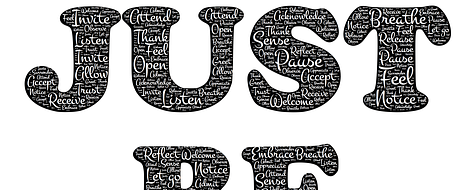Acceptance
Posted on 10th January 2019
Lack of acceptance causes pain, of that there can be no doubt. There’s that prayer about changing those things that can be changed, accepting those things which cannot be changed, and having the wisdom to know the difference.
An important piece of acceptance is that something that has happened can never be UNhappened. Without such acceptance, there can be anger, resent, bad manners… but no matter what, the event still happened. If somebody steals your car, you can rant and rave, you can shout and scream, and all that happens is you upset your body chemistry, feel wretched and you STILL have no car. Nothing constructive has happened. Accept that the car has gone and you can begin to work out how best to deal with the situation. Acceptance of that which cannot be changed is one of the tenets of contentment in life – an extraordinarily valuable commodity.
Now we’ll look at two particularly difficult areas where acceptance is essential, yet often difficult to find:
– The break-up of a relationship.
– Aspects of self which are perceived as ‘negative’
The break-up of a relationship, especially a long-standing one, is one of the most painful situations that the human psyche can experience. We are bereaved just as surely as if the other person had died – in fact, the pain is often *worse* than if death had occurred. Some people never fully recover, yet others seem to ‘bounce’ disgustingly quickly. Personality type comes into this, of course, as well as perceptions of guilt and self-recrimination. Often, too, the grieving is not for what has been lost, but for what the relationship never was, and that somehow makes it all the more difficult to bear.
Acceptance behaves like a magical balm, allowing the subconscious to move on, to make new plans, to find new happiness and new fun. When it is accepted that the person who has left is not coming back, longing and waiting can stop. We no longer need to keep on listening for the telephone to ring or to anxiously scan every email, text, or piece of mail. When it happens suddenly – which I have seen happen many times in my consulting room – it is almost as if a miracle had occurred. We can smile again and mean it.
There are no magical words that will make acceptance happen; it has to come from a deep recognition that just wanting somebody to ‘come back’ won’t make them come back; and more, if we find a way to persuade, cajole, force or blackmail a lost lover/companion into returning, what then? We have to be constantly on our guard, lest they leave again, because we *know* that they don’t truly want to be with us. There’s no joy there, only more pain as we are constantly reminded that the relationship is not what we wanted it to be.
Much better to accept, let go, and move forward.
The second aspect of acceptance mentioned here can have a profound effect upon overall well-being and happiness in life – the acceptance of aspects of self that might be perceived as negative. We all have aspects of our personality and ‘way of being’ that we feel uncomfortable about; maybe we see ourselves as selfish, dim on occasions, over-emotional, under-responsive, or any one of a whole variety of pretty standard human behaviour patterns.
The trouble is that when anybody mentions any of those things, our self-worth sags and personal confidence is dented. Yet accept those things as just part of what goes to make the whole of you and that overall, you are no worse and no better than the next human being and you can start to enjoy being you and all that being you means.
I’ll illustrate this with a story.
Billy the Chatterbox
When a young boy started school, his first school report said: “Billy is very bright but he is a chatterbox – he never stops talking.” Now, this was true, and his parents laughed about it; they showed relatives, who also laughed. The same sort of thing was repeated the next term and the term after… “Billy is intelligent but he never stops talking.” He didn’t really understand what was such a bad thing about talking – he was fascinated by lots of things and loved to talk about them. That people laughed every time a school report was read made him uncomfortable and eventually he decided that if this was a bad thing, or laughable, he had better stop.
His efforts were in vain; so many things fascinated him that enthusiasm would burst out of him in a torrent of excited chatter. One day, when he was a young adult, somebody said: “My God, do you never stop talking?” That hit hard at the sore spot that had been created over the years and he suddenly started to stutter. Then people laughed even more. Eventually, he developed a social phobia which left him fearful of social gatherings of any sort. Parties, dinners, holidays, even family get-togethers – all of these were no-go areas for Billy.
He became introverted and timid and eventually found himself with a therapist, recounting those early experiences of people laughing because he was a chatterbox.
“Tell me again about that teacher,” the therapist said.
“She said I never stopped talking,” Billy replied.
“That’s funny,” the therapist said. “I though you told me she said you were intelligent.”
“Well, yes she did,” Billy agreed. “But I don’t think I noticed that bit.”
From that moment on, Billy began to recognise that he, encouraged by others, had seen only the ‘he talks too much’ part of what had been written on his school reports. His adult psyche recognised that his talking was an expression of his ability to understand and his enthusiasm for life and learning. It was like the Ugly Duckling story all over again! There was an almost instant acceptance that he was a natural talker, a communicator of ideas and concepts.
Time passed. Billy talked A LOT and if anybody said anything at all about it, he would simply smile and agree with them. “I’ve always been talkative,” he would say, “Thank goodness. I love to share all my ideas.” No comments could hit any target now and there was no longer a sore spot; he knew that his talkativeness was a measure of his intelligence and his entire joy of living.
Acceptance is a wonderful thing. Accept the way you are and embrace it – warts and all – and you will become instantly more comfortable with yourself and others. When you accept those facets of self which you thought were negative, no matter what they are, nobody can push your buttons any more because you won’t be trying to hide them.
Book a FREE initial consultation
- Does Hypnosis Work for Phobias? Posted on 23rd November 2023 at 10:45
- Women's Awards (East Midlands) Posted on 25th September 2023 at 15:01
- Does Hypnotherapy Really Work? Posted on 16th August 2023 at 14:01
- Understanding Panic Attacks: A Holistic Approach to Managing Anxiety Posted on 17th July 2023 at 14:55
Tagged as: direction
Share this post:


